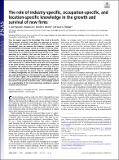| dc.contributor.author | Jara-Figueroa, C | |
| dc.contributor.author | Jun, Bogang | |
| dc.contributor.author | Glaeser, Edward L | |
| dc.contributor.author | Hidalgo, Cesar A | |
| dc.date.accessioned | 2021-10-27T20:09:51Z | |
| dc.date.available | 2021-10-27T20:09:51Z | |
| dc.date.issued | 2018 | |
| dc.identifier.uri | https://hdl.handle.net/1721.1/134918 | |
| dc.description.abstract | © 2018 National Academy of Sciences. All Rights Reserved. How do regions acquire the knowledge they need to diversify their economic activities? How does the migration of workers among firms and industries contribute to the diffusion of that knowledge? Here we measure the industry-, occupation-, and location-specific knowledge carried by workers from one establishment to the next, using a dataset summarizing the individual work history for an entire country. We study pioneer firms—firms operating in an industry that was not present in a region—because the success of pioneers is the basic unit of regional economic diversification. We find that the growth and survival of pioneers increase significantly when their first hires are workers with experience in a related industry and with work experience in the same location, but not with past experience in a related occupation. We compare these results with new firms that are not pioneers and find that industry-specific knowledge is significantly more important for pioneer than for nonpioneer firms. To address endogeneity we use Bartik instruments, which leverage national fluctuations in the demand for an activity as shocks for local labor supply. The instrumental variable estimates support the finding that industry-specific knowledge is a predictor of the survival and growth of pioneer firms. These findings expand our understanding of the micromechanisms underlying regional economic diversification. | |
| dc.language.iso | en | |
| dc.publisher | Proceedings of the National Academy of Sciences | |
| dc.relation.isversionof | 10.1073/PNAS.1800475115 | |
| dc.rights | Article is made available in accordance with the publisher's policy and may be subject to US copyright law. Please refer to the publisher's site for terms of use. | |
| dc.source | PNAS | |
| dc.title | The role of industry-specific, occupation-specific, and location-specific knowledge in the growth and survival of new firms | |
| dc.type | Article | |
| dc.contributor.department | Massachusetts Institute of Technology. Media Laboratory | |
| dc.contributor.department | Massachusetts Institute of Technology. Media Laboratory | |
| dc.relation.journal | Proceedings of the National Academy of Sciences of the United States of America | |
| dc.eprint.version | Final published version | |
| dc.type.uri | http://purl.org/eprint/type/JournalArticle | |
| eprint.status | http://purl.org/eprint/status/PeerReviewed | |
| dc.date.updated | 2019-07-22T18:51:36Z | |
| dspace.orderedauthors | Jara-Figueroa, C; Jun, B; Glaeser, EL; Hidalgo, CA | |
| dspace.date.submission | 2019-07-22T18:51:44Z | |
| mit.journal.volume | 115 | |
| mit.journal.issue | 50 | |
| mit.metadata.status | Authority Work and Publication Information Needed | |
